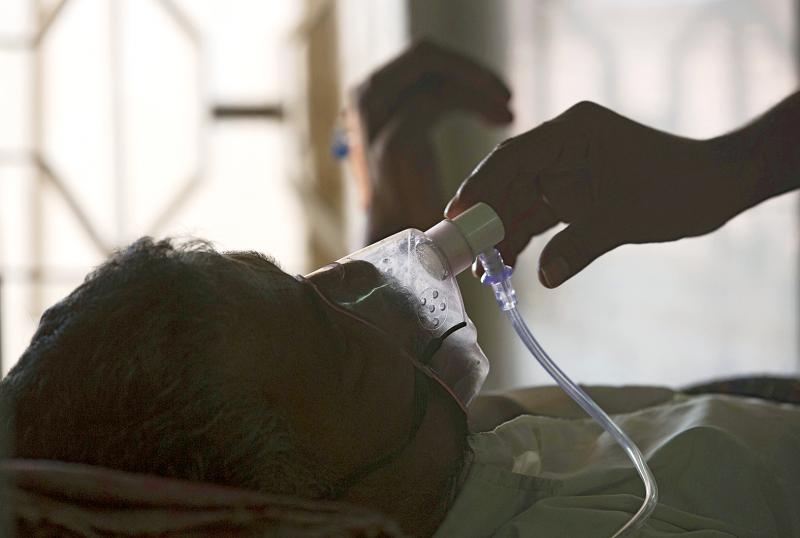The number of people killed by tuberculosis (TB) has risen for the first time in more than a decade, largely because fewer people have been tested and treated as resources were diverted to fight the COVID-19 pandemic, the WHO said on Thursday.
In its yearly report on TB, the UN health agency said that 1.5 million people worldwide died of the bacterial disease last year, a slight rise from the 1.4 million deaths in 2019.
Evidence of the ancient disease has been found in Egyptian mummies and it is believed to have killed more people in history than any other infectious illness; TB routinely kills more people every year than AIDS and malaria.

Photo: AP
The WHO also said that far fewer people were newly diagnosed with TB last year — 5.8 million versus 7.1 million in 2019.
The agency estimates that about 4 million people have TB, but have yet to be diagnosed, a rise from 2.9 million people the previous year.
The disease is caused by a bacterium that often infects the lungs and is highly transmissible when those sickened by it cough or sneeze. About one-quarter of the world’s population has a latent TB infection, meaning they carry the bacterium, but have not become ill and cannot transmit it. Those who harbor the bacterium have a 5 to 10 percent chance of eventually developing TB.
The disease is treatable if caught early, but drug-resistant versions have complicated treatment efforts and scientists are increasingly worried the bacterium will soon outpace available medicines.
The countries with the highest numbers of TB cases include Bangladesh, China, India, Indonesia, the Philippines, Nigeria and South Africa.
“We cannot accept that year after year, 1.5 million people die from the curable disease TB because they do not have access to the diagnostics and drugs that can save their lives,” said Stijn Deborggraev, diagnostics adviser for Doctors Without Borders’ Access campaign.
In a statement, Deborggraev said that access to testing was limited in many countries with high numbers of TB patients because they depend on tests made by the US company Cepheid, which he claimed was overcharging poorer countries for their tests.
He said that Cepheid had received more than US$250 million in public investment to develop its TB testing technology and has failed to make it accessible to those who need it most.
The company said they have made their test cartridges available to poorer countries “at low margin,” adding that they are “an active participant in the global fight against TB.”

END OF AN ERA: The vote brings the curtain down on 20 years of socialist rule, which began in 2005 when Evo Morales, an indigenous coca farmer, was elected president A center-right senator and a right-wing former president are to advance to a run-off for Bolivia’s presidency after the first round of elections on Sunday, marking the end of two decades of leftist rule, preliminary official results showed. Bolivian Senator Rodrigo Paz was the surprise front-runner, with 32.15 percent of the vote cast in an election dominated by a deep economic crisis, results published by the electoral commission showed. He was followed by former Bolivian president Jorge “Tuto” Quiroga in second with 26.87 percent, according to results based on 92 percent of votes cast. Millionaire businessman Samuel Doria Medina, who had been tipped

ELECTION DISTRACTION? When attention shifted away from the fight against the militants to politics, losses and setbacks in the battlefield increased, an analyst said Recent clashes in Somalia’s semi-autonomous Jubaland region are alarming experts, exposing cracks in the country’s federal system and creating an opening for militant group al-Shabaab to gain ground. Following years of conflict, Somalia is a loose federation of five semi-autonomous member states — Puntland, Jubaland, Galmudug, Hirshabelle and South West — that maintain often fractious relations with the central government in the capital, Mogadishu. However, ahead of elections next year, Somalia has sought to assert control over its member states, which security analysts said has created gaps for al-Shabaab infiltration. Last week, two Somalian soldiers were killed in clashes between pro-government forces and

Ten cheetah cubs held in captivity since birth and destined for international wildlife trade markets have been rescued in Somaliland, a breakaway region of Somalia. They were all in stable condition despite all of them having been undernourished and limping due to being tied in captivity for months, said Laurie Marker, founder of the Cheetah Conservation Fund, which is caring for the cubs. One eight-month-old cub was unable to walk after been tied up for six months, while a five-month-old was “very malnourished [a bag of bones], with sores all over her body and full of botfly maggots which are under the

BRUSHED OFF: An ambassador to Australia previously said that Beijing does not see a reason to apologize for its naval exercises and military maneuvers in international areas China set off alarm bells in New Zealand when it dispatched powerful warships on unprecedented missions in the South Pacific without explanation, military documents showed. Beijing has spent years expanding its reach in the southern Pacific Ocean, courting island nations with new hospitals, freshly paved roads and generous offers of climate aid. However, these diplomatic efforts have increasingly been accompanied by more overt displays of military power. Three Chinese warships sailed the Tasman Sea between Australia and New Zealand in February, the first time such a task group had been sighted in those waters. “We have never seen vessels with this capability